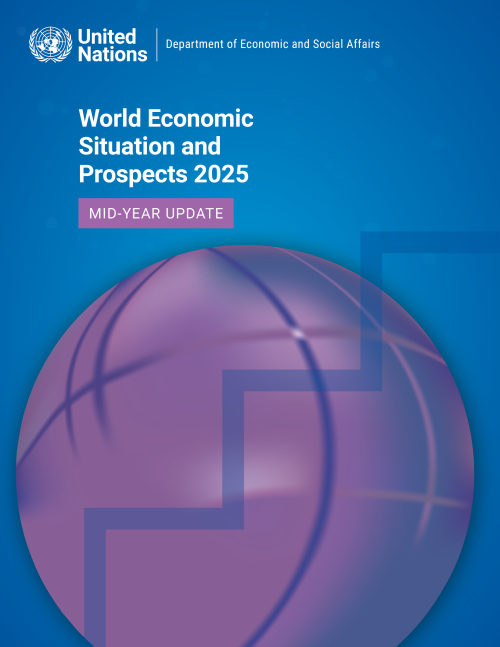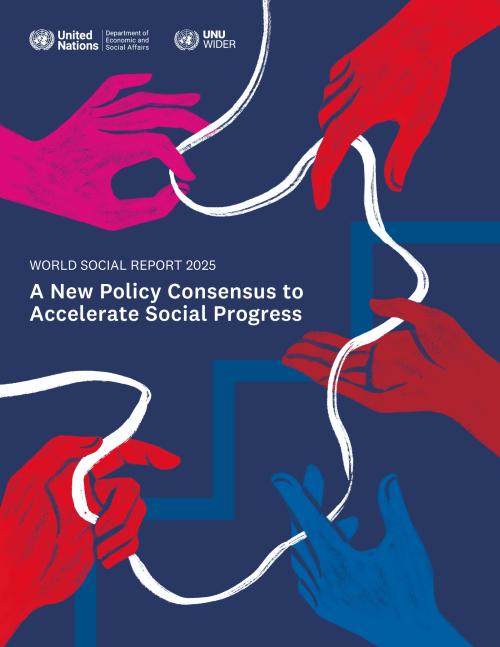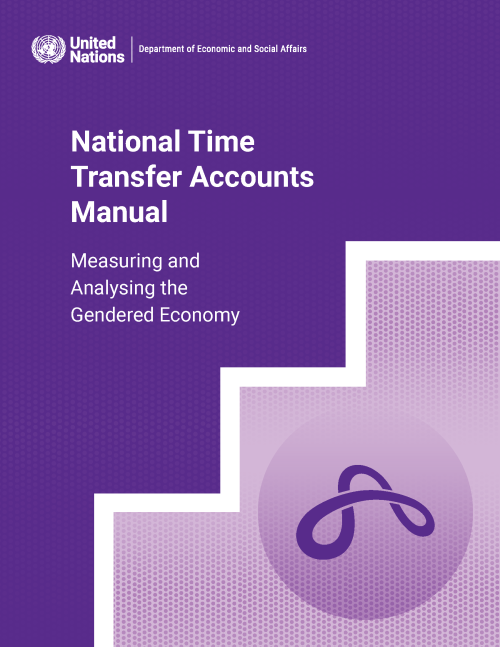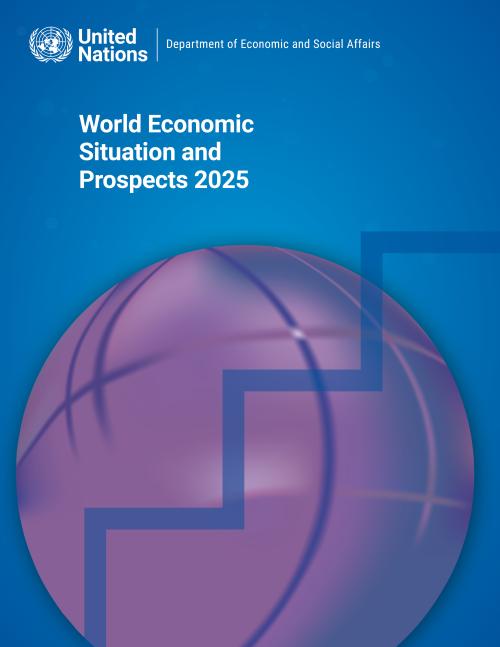
The World Youth Report on Youth Mental Health and Well-being examines how youth mental health and well-being are shaped by six social determinants, i.e. education, employment, family dynamics, poverty, technology, and societal attitudes. The Report highlights how inequalities in these areas create disparities in mental health outcomes, noting that stigma, discrimination, and unequal access to opportunities and care compound risks for young people.
Drawing on extensive literature reviews, expert consultations, youth surveys, and real-life youth testimonies, the Report stresses cross-sectoral action, inclusive policies, and youth-led initiatives. Ultimately, it calls for…

Global economic output is forecast to grow by 2.7 per cent in 2026, slightly below the 2.8 per cent estimated for 2025 and well below the pre-pandemic average of 3.2 per cent.
During 2025, unexpected resilience to sharp increases in U.S. tariffs, supported by solid consumer spending and easing inflation, helped sustain growth. However, underlying weaknesses persist. Subdued investment and limited fiscal space are weighing on economic activity, raising the prospect that the world economy could settle into a persistently slower growth path than in the pre-pandemic era.
The report notes that a partial easing of trade tensions helped limit disruptions to international commerce…

As the United Nations marks its 80th anniversary in 2025, this report by the Department of Economic and Social Affairs (UN DESA) traces the evolution of sustainable development within the UN system. It highlights the organization’s role in shaping both the understanding and the practical application of sustainable development.

The UN DESA Annual Highlights report is a tool to communicate the contributions of the Department to the realization of internationally agreed development goals and shared social, economic, and environmental aspirations. It showcases the Department’s role in gauging trends, building capacities, and shaping solutions. UN DESA Highlights 2025 covers activities over the period of the 79th Session of the General Assembly (September 2024 – August 2025) and reflects the Department’s response to the set priorities and expressed needs of Member States. Seven (7) thematic chapters showcase how UN DESA put its expertise to the task of supporting Member State efforts to implement the 2030 Agenda…

The global economy is expected to experience subdued growth in the coming months amid a challenging trade environment and heightened macroeconomic uncertainties. The world economy is projected to grow by 2.5 per cent in both 2025 and 2026 — below the 2.8 per cent recorded in 2024 and the pre-pandemic average of 3.2 per cent (2010–2019). The 2025 forecast has been raised by 0.1 percentage points since May, while the 2026 outlook is unchanged, with both remaining well below expectations at the start of the year. The modest upgrade to the 2025 outlook reflects stronger-than expected frontloading of economic activity ahead of new U.S. tariffs, lower effective U.S. tariff rates than initially…

Progress on the Sustainable Development Goals: The Gender Snapshot 2025 is the latest edition in an annual series produced by UN Women and the United Nations Department of Economic and Social Affairs. Covering all 17 Goals of the 2030 Agenda for Sustainable Development, the report spotlights the latest data and evidence on gender equality, tracking trends and revealing progress and gaps.
The 2025 Gender Snapshot sounds the alarm: If current trends continue, the world will reach 2030 with 351 million women and girls still living in extreme poverty and the Sustainable Development Goals, particularly SDG 5 to achieve gender equality and…

The Sustainable Development Goals Report 2025 marks the tenth annual stocktaking of global progress toward the 2030 Agenda for Sustainable Development. With the 2030 deadline only five years away, the report delivers a stark assessment: the Sustainable Development Goals have improved millions of lives, but the current pace of change is insufficient to fully achieve all the Goals by 2030.
The report reveals real and substantial development gains during the past decade. Since 2015, the world has made notable strides in expanding access to education, improving maternal and child health, and bridging the digital divide. Effective prevention efforts have significantly reduced the…

The world economy is at a precarious moment. Heightened trade tensions, along with policy uncertainty, have significantly weakened the global economic outlook for 2025. Higher tariffs—resulting in a significant increase in the effective tariff rate in the United States of America—are likely to strain global supply chains, drive up production costs and delay critical investment decisions, while also contributing to financial market volatility. Global economic growth is now projected to slow to 2.4 per cent in 2025, down from 2.9 per cent in 2024, and 0.4 percentage points below the January forecast. The downward revisions in growth forecasts are broad-based, affecting both developed and…

Economic insecurity, staggering levels of inequality, declining social trust and social fragmentation are destabilizing societies worldwide. The World Social Report 2025, reveals trends that are threatening communities and demand immediate, decisive policy action. The report calls for a new policy consensus anchored in three principles—equity, economic security for all, and solidarity—that are essential to strengthen the three dimensions of sustainable development.
The report is the first to be co-produced with the United Nations University World Institute for Development Economics Research (UNU-WIDER). This collaboration brings new research insights into the report,…

In an era marked by complex and interwoven crises, the role of the United Nations in preparing for the future has never been more critical. This review of UN DESA’s foresight and preparedness efforts shows how the Department’s economic and demographic forecasts, capacity development programmes, and work towards accelerating an inclusive and just transition help governments and people make strategic choices to shape and prepare for the future they want.

This manual picks up where the previous manual in the series left off. The earlier manual, on the methodology of National Transfer Accounts (NTAs), shows how National Accounts data can be used to construct age profiles of economic production and consumption and to illustrate how resources flow from persons in age groups producing more than they consume to those in age groups producing less than they consume (United Nations, 2013).
The NTA project calls this system of age-based transfers the “generational economy”. Uncovering and elucidating the role of such transfers has been the project’s major contribution. NTA research has revealed how countries have evolved various means…

Global economic growth is projected to remain at 2.8 per cent in 2025, unchanged from 2024, according to the United Nations flagship report, World Economic Situation and Prospects (WESP) 2025. While the global economy has demonstrated resilience, withstanding a series of mutually reinforcing shocks, growth remains below the pre-pandemic average of 3.2 per cent, constrained by weak investment, sluggish productivity growth, and high debt levels.
The report notes that lower inflation and ongoing monetary easing in many economies could provide a modest boost to global economic activity in 2025. However, uncertainty still looms large, with risks stemming from geopolitical conflicts,…
 Welcome to the United Nations
Welcome to the United Nations